人教版(2019)选择性必修 第三册Unit 3 Environmental Protection Using Language(1)—Listening and Speaking 课件(共20张PP
文档属性
| 名称 | 人教版(2019)选择性必修 第三册Unit 3 Environmental Protection Using Language(1)—Listening and Speaking 课件(共20张PP |
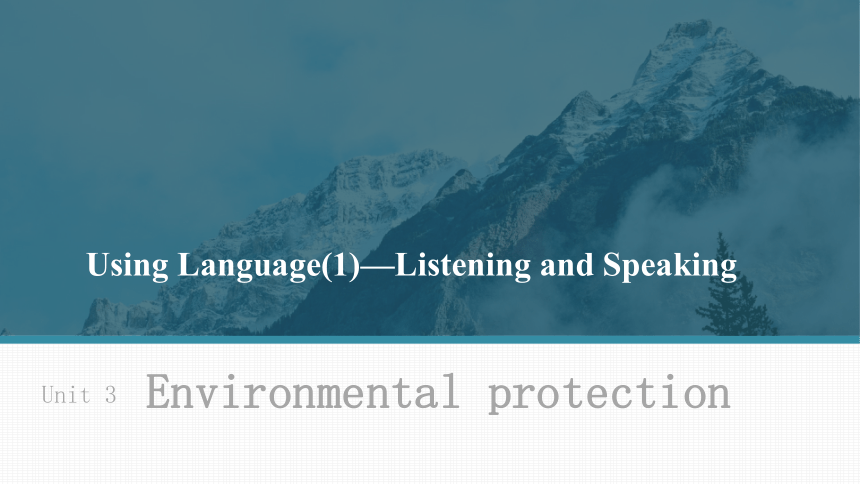
|
|
| 格式 | pptx | ||
| 文件大小 | 13.1MB | ||
| 资源类型 | 教案 | ||
| 版本资源 | 人教版(2019) | ||
| 科目 | 英语 | ||
| 更新时间 | 2024-04-08 00:00:00 | ||
图片预览

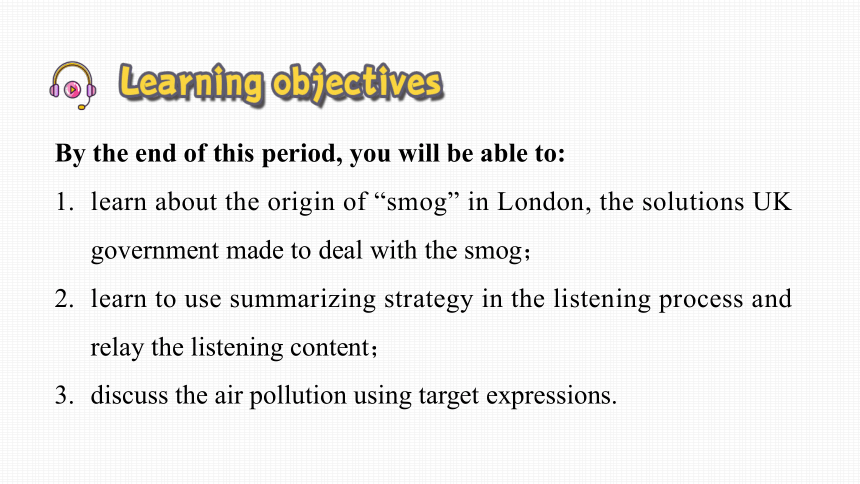
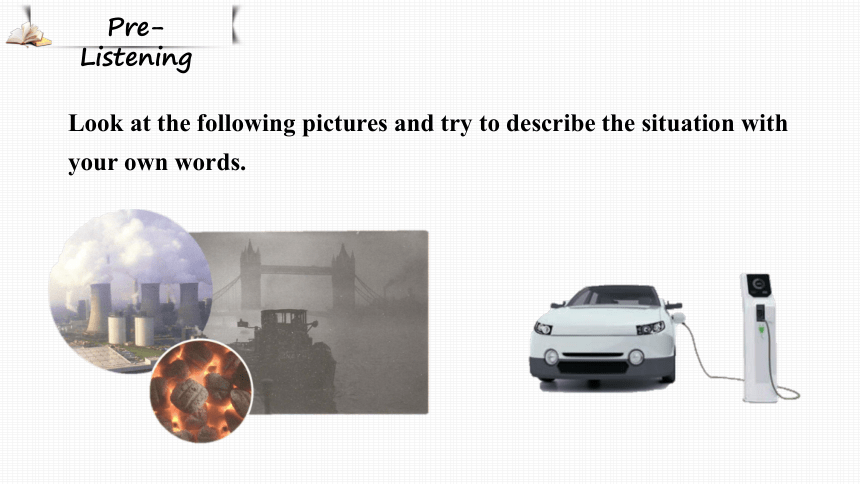
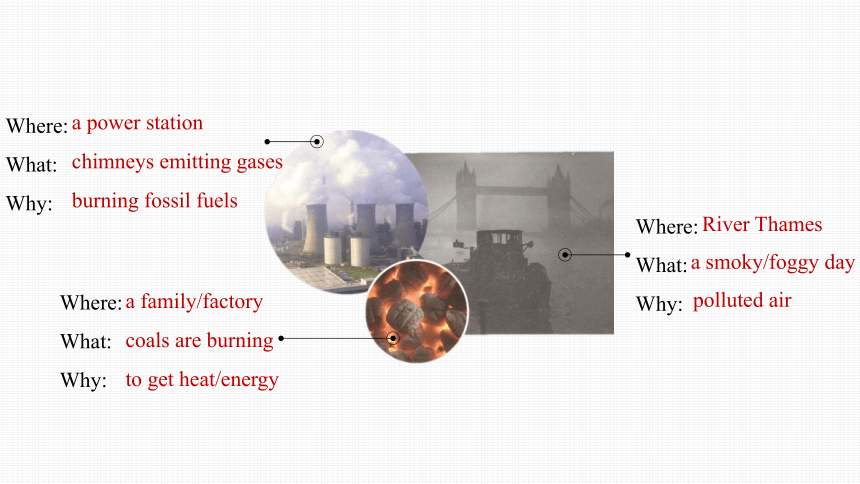
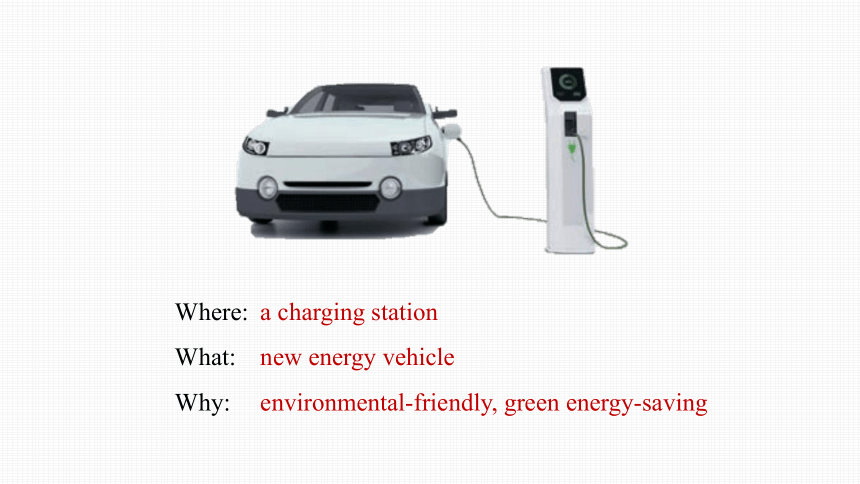
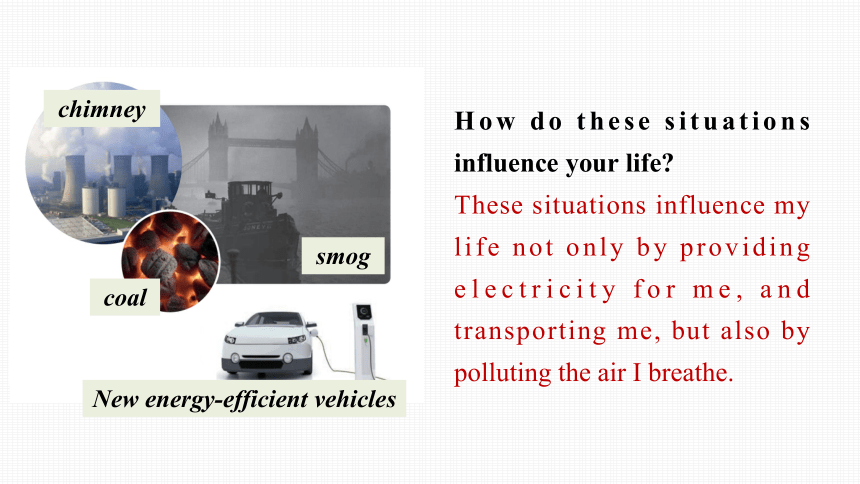


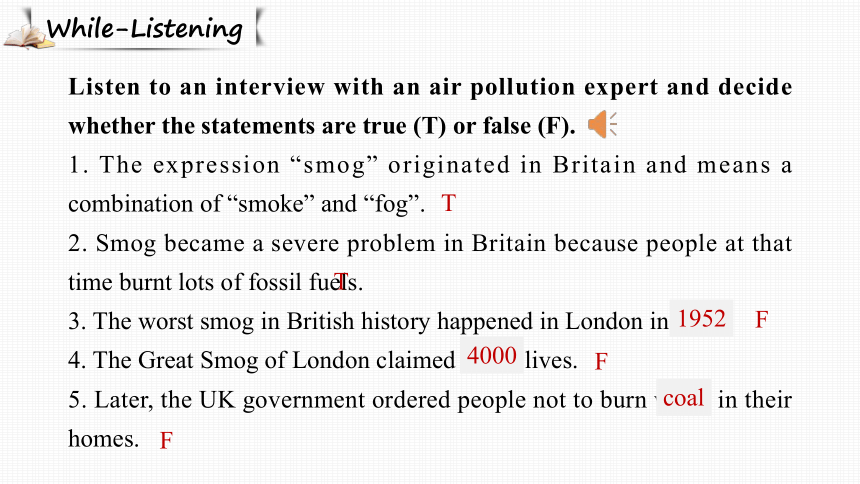
文档简介
(共20张PPT)
Unit 3
Environmental protection
Using Language(1)—Listening and Speaking
By the end of this period, you will be able to:
learn about the origin of “smog” in London, the solutions UK government made to deal with the smog;
learn to use summarizing strategy in the listening process and relay the listening content;
discuss the air pollution using target expressions.
Look at the following pictures and try to describe the situation with your own words.
Pre-Listening
Where:
What:
Why:
a power station
chimneys emitting gases
burning fossil fuels
Where:
What:
Why:
a family/factory
coals are burning
to get heat/energy
Where:
What:
Why:
River Thames
a smoky/foggy day
polluted air
Where:
What:
Why:
a charging station
new energy vehicle
environmental-friendly, green energy-saving
How do these situations influence your life
These situations influence my life not only by providing electricity for me, and transporting me, but also by polluting the air I breathe.
New energy-efficient vehicles
chimney
coal
smog
When there were numbers, we underlined the different numbers and pronounced in advance.
While listening, we look at the questions first, and circle the important words.
I prefer to listen to the radio for many times, then I will turn to the script to understand it better.
Do you know what we have done to improve the air quality
Let’s listen to an interview to know more about it.
Listen to an interview with an air pollution expert and decide whether the statements are true (T) or false (F).
1. The expression “smog” originated in Britain and means a combination of “smoke” and “fog”.
2. Smog became a severe problem in Britain because people at that time burnt lots of fossil fuels.
3. The worst smog in British history happened in London in 1942.
4. The Great Smog of London claimed 5,000 lives.
5. Later, the UK government ordered people not to burn wood in their homes.
While-Listening
T
T
F
F
F
1952
4000
coal
Listen again and take notes on what the expert said. Then summarize the information you got from the interview.
Summarize information
In active listening, summarizing helps you review the key points of a speaker's message. In order to write a good summary, you must take notes of the most important points as you listen. When summarizing, you need to be as concise as possible and use your own words.
Ben Drake, an export on air pollution, is being interviewed on the radio. He said that smog was a severe problem ______________ century in Britain. At that time, Britain was experiencing a boom in _________. Factories and homes ______________, which created smog. He also mentioned the heavy smog in London ___________________________________________ in 1952. Later the UK government restricted ___________ in homes and forced factories to __________________________. As smog is harmful to everyone, the expert advised us to ____________________________________, use __________________________, and further develop ________________.
industry
was particularly bad and caused over 4,000 deaths
in the early 20th
burning coal
move away from city centers
replace coal with cleaner forms of energy
new energy-efficient vehicles
green technology
used lots of coal
Listening text
Hostess: Good morning, listeners. Air pollution is a serious problem, with urban populations particularly at risk from smog. Ben Drake is an expert on air pollution, and he is joining us today to talk about this issue. Ben, where does the word “smog” come from
Ben Drake: “Smog” comes from a combination of the words “smoke” and “fog”. It originated in Britain in the early 20th century, when smog was a severe problem.
Hostess: Why was it so bad then
Ben Drake: Well, Britain was one of the first industrial countries and factories and homes used lots of coal. When burnt, the coal produced harmful emissions which created lots of smog. In London, they also called the smog a “pea soup” because it was as thick as soup.
Hostess: That sounds terrible! What problems did it cause
Ben Drake: Smog caused many health issues and killed many people. The worst case happened in London in 1952. Over a few days when the smog was particularly bad, 4,000 deaths were recorded. It was necessary to take immediate action. The UK government ordered people not to burn coal in their homes and forced factories to move away from city centres.
Hostess: But smog is still an important issue in many places. What can be done about it
Ben Drake: Smog is harmful to everyone, especially to children, old people, and those with heart or lung problems. We have to reduce smog
and improve air quality for everyone’s health and wellbeing. We should replace coal with cleaner forms of energy, and we need to use new energy-efficient vehicles. We have the technology, but we must use and develop it.
Hostess: Yes. Let’s hope we can make some big changes. Thanks, Ben.
Ben Drake: Thank you.
Work in Groups
Have you experienced heavy smog where you live Have you seen photos of big cities under clouds of smog What is it like
What do you think are the major causes of smog in China
What measures have the government and citizens taken to help address the problem
Post-Listening
Everyone knows that ...
Most people think that ...
As is known to all, ...
Referring to common knowledge
There is no doubt that ...
We all know that ...
It is obvious that ...
1. Have you experienced heavy smog where you live Have you seen photos of big cities under clouds of smog What is it like
I have occasionally experienced heavy smog where I live. I have also seen pictures of heavy smog over cities. It is very thick and hard to see through. There is no doubt that it is not a good thing.
2. What do you think are the major causes of smog in China
Industry and vehicles are the major causes of smog in China.
3. What measures have the government and citizens taken to help address the problem
Most people think that pollution at a certain level is a necessary result of growth, but the government is taking measures to keep it in check by developing green energy solutions and controlling factory and vehicle emissions.
Finish the exercise that is given today.
Homework
Unit 3
Environmental protection
Using Language(1)—Listening and Speaking
By the end of this period, you will be able to:
learn about the origin of “smog” in London, the solutions UK government made to deal with the smog;
learn to use summarizing strategy in the listening process and relay the listening content;
discuss the air pollution using target expressions.
Look at the following pictures and try to describe the situation with your own words.
Pre-Listening
Where:
What:
Why:
a power station
chimneys emitting gases
burning fossil fuels
Where:
What:
Why:
a family/factory
coals are burning
to get heat/energy
Where:
What:
Why:
River Thames
a smoky/foggy day
polluted air
Where:
What:
Why:
a charging station
new energy vehicle
environmental-friendly, green energy-saving
How do these situations influence your life
These situations influence my life not only by providing electricity for me, and transporting me, but also by polluting the air I breathe.
New energy-efficient vehicles
chimney
coal
smog
When there were numbers, we underlined the different numbers and pronounced in advance.
While listening, we look at the questions first, and circle the important words.
I prefer to listen to the radio for many times, then I will turn to the script to understand it better.
Do you know what we have done to improve the air quality
Let’s listen to an interview to know more about it.
Listen to an interview with an air pollution expert and decide whether the statements are true (T) or false (F).
1. The expression “smog” originated in Britain and means a combination of “smoke” and “fog”.
2. Smog became a severe problem in Britain because people at that time burnt lots of fossil fuels.
3. The worst smog in British history happened in London in 1942.
4. The Great Smog of London claimed 5,000 lives.
5. Later, the UK government ordered people not to burn wood in their homes.
While-Listening
T
T
F
F
F
1952
4000
coal
Listen again and take notes on what the expert said. Then summarize the information you got from the interview.
Summarize information
In active listening, summarizing helps you review the key points of a speaker's message. In order to write a good summary, you must take notes of the most important points as you listen. When summarizing, you need to be as concise as possible and use your own words.
Ben Drake, an export on air pollution, is being interviewed on the radio. He said that smog was a severe problem ______________ century in Britain. At that time, Britain was experiencing a boom in _________. Factories and homes ______________, which created smog. He also mentioned the heavy smog in London ___________________________________________ in 1952. Later the UK government restricted ___________ in homes and forced factories to __________________________. As smog is harmful to everyone, the expert advised us to ____________________________________, use __________________________, and further develop ________________.
industry
was particularly bad and caused over 4,000 deaths
in the early 20th
burning coal
move away from city centers
replace coal with cleaner forms of energy
new energy-efficient vehicles
green technology
used lots of coal
Listening text
Hostess: Good morning, listeners. Air pollution is a serious problem, with urban populations particularly at risk from smog. Ben Drake is an expert on air pollution, and he is joining us today to talk about this issue. Ben, where does the word “smog” come from
Ben Drake: “Smog” comes from a combination of the words “smoke” and “fog”. It originated in Britain in the early 20th century, when smog was a severe problem.
Hostess: Why was it so bad then
Ben Drake: Well, Britain was one of the first industrial countries and factories and homes used lots of coal. When burnt, the coal produced harmful emissions which created lots of smog. In London, they also called the smog a “pea soup” because it was as thick as soup.
Hostess: That sounds terrible! What problems did it cause
Ben Drake: Smog caused many health issues and killed many people. The worst case happened in London in 1952. Over a few days when the smog was particularly bad, 4,000 deaths were recorded. It was necessary to take immediate action. The UK government ordered people not to burn coal in their homes and forced factories to move away from city centres.
Hostess: But smog is still an important issue in many places. What can be done about it
Ben Drake: Smog is harmful to everyone, especially to children, old people, and those with heart or lung problems. We have to reduce smog
and improve air quality for everyone’s health and wellbeing. We should replace coal with cleaner forms of energy, and we need to use new energy-efficient vehicles. We have the technology, but we must use and develop it.
Hostess: Yes. Let’s hope we can make some big changes. Thanks, Ben.
Ben Drake: Thank you.
Work in Groups
Have you experienced heavy smog where you live Have you seen photos of big cities under clouds of smog What is it like
What do you think are the major causes of smog in China
What measures have the government and citizens taken to help address the problem
Post-Listening
Everyone knows that ...
Most people think that ...
As is known to all, ...
Referring to common knowledge
There is no doubt that ...
We all know that ...
It is obvious that ...
1. Have you experienced heavy smog where you live Have you seen photos of big cities under clouds of smog What is it like
I have occasionally experienced heavy smog where I live. I have also seen pictures of heavy smog over cities. It is very thick and hard to see through. There is no doubt that it is not a good thing.
2. What do you think are the major causes of smog in China
Industry and vehicles are the major causes of smog in China.
3. What measures have the government and citizens taken to help address the problem
Most people think that pollution at a certain level is a necessary result of growth, but the government is taking measures to keep it in check by developing green energy solutions and controlling factory and vehicle emissions.
Finish the exercise that is given today.
Homework
